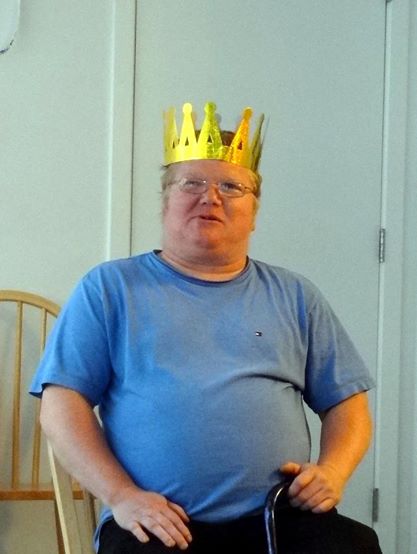When we came to Haverhill, I wanted to build a church that connected primarily with two groups of people: those on the margins and post-Christian 20-somethings.
Connecting with these groups of people has perpetually confounded my denomination. In the moment when we realized that inviting people into a better version of the 1920’s might no longer be effective, people started proposing solutions.. Generally speaking, these solutions were proposed by parents of those 20-somethings, those on the margins often not being particularly sought after, due to their messy lives or general lack of money.
The solutions were:
- A) Do more contemporary worship! Because young people would love it if we get a really bad band together and play all the songs in the style that we loved when we were young adults in the 1980’s!
- B) Get more videos! Because young people like all that media that looks like those MTV music videos that we loved when we were young adults in the 1980’s!
- C) Get someone who has a lot of energy and great hair to lead worship! Because all those young people need a pastor who looks like a member of those hair bands we loved when we were young adults in the 1980’s!
- D) Throw a pizza party and play silly games! Because all those young people secretly want a church that will still treat them like they’re eight years old (which they were when we were young adults in the 1980’s!)
Who was going to unlock the secret to a church that would attract both all those mysterious young people and also those people on the margins that everyone secretly knows Jesus would be hanging out with?
Us.
I already had my first book started and I wanted stories: not the typical “I went to another church, but I didn’t like the worship/pastor/sermons/theology so I found you all, and your worship/pastor/sermons/theology just feeds me (feeds me? Really? What are we? Cattle? You know what happens to them!) and it just makes me so happy!”
I wanted amazing stories.
Stories like: “Once upon a time, I didn’t even believe in God or organized religion. I thought that all Christians were just a bunch of mean, old, ignorant white people. But then – I MET all of you! And now – I believe in God! Jesus is my best friend! And I spend all my time volunteering, worshiping, studying scripture, and telling my friends about Jesus over lattes or craft beer!”
Stories like: “Once upon a time, I was living on the street. I slept in a paper bag every night! I was addicted to seventeen different drugs! I had three major mental illnesses! And then, I MET all of you! And now- through God’s power, my hard work, and your amazing awesomeness, my life is transformed! When I’m not living in my new apartment, working at my new job, or going to my new institution of higher learning, I’m volunteering, worshiping, studying scripture, and recording compelling fundraising videos about how awesome you all are!”
“God,” I prayed. “Just send me a few of those people!”
Then, something funny happened.
Or, at least, I’m sure that God found it pretty funny.
God sent us a few of those people.
Matter of fact, God sent us a lot of those people and they didn’t fit well in my pre-written stories.
After about six months, I began to learn two very important lessons about the new people I was growing community with:
The first was this: young adults and people on the margins are great. I learned to love many of them, to appreciate their gifts, and to celebrate their wisdom. Many of them are still my friends today. However, they are really hard to build a church with.
Take, for instance, those who struggle with addiction.
(A note to all who are in recovery or work with those who are: I know that addicts, like all people, come in many different shapes and sizes. Many of them are incredibly wise, mature people. You ever want to see what honesty and authenticity look like? Go to a good AA meeting and just listen. What I’m talking about here is the huge group of people who are known in twelve step recovery as the “two-steppers”: those who get into the program, will tell others all about how wonderful it is, but never do the hard work in between.)
If you want a good boost to your ministerial ego, talk to an addict four to six weeks after they’ve engaged with your ministry. They will tell you how you walk on water, levitate about six inches off the ground, and even shit diamonds. They will convince you that you are the best human being walking on God’s green earth.
However, wait about six months. Wait until that amazing new-church smell wears off. Wait for a life change. Wait until you (or someone else in the group) says something that pisses them off. Wait for the first dry spell. Most will leave, and they will convince you that their new behavior (which is often connected with the new substances they’re now using again) is either A) your fault, or B) definitely not their fault.
At first, I just loved it when a new addict would walk into one of our groups.
“Oh Great!” I said, “Another addict!”
They’d speak honestly, they’d invite all their friends, and they’d burn with appealing enthusiastic brightness.
Inevitability, however, they’d not do their work, and if I was lucky, they’d disappear. If I wasn’t lucky, they’d exit messily, leaving a bunch of wreckage behind them.
Some people are good at tolerating the ups and downs and being patient.
I was not one of them. I struggled to stick with all those people I had asked for.
In the end, it’s just hard to build a church when people haven’t learned discipline, conflict resolution, or basic life skills and aren’t always interested in learning about them either.
I developed a set of aggressively rose-colored glasses. I would look at another wonderfully undeveloped person, squinting at them from every possible angle, trying to convince myself that they had leadership potential in the near future. I could take the smallest positive sign (Look! That person brought potato chips to the Bible study without being asked!) and construe it as a prediction of their future greatness as a leader.
However, no matter how hard I squinted, changed my angle, or looked at them cross-eyed, all my frantically hopeful dreams eventually had to make contact with reality.
That’s when I learned my second lesson about those two populations groups that I had idealized.
People are people, not amazing stories just waiting to happen. They are on their own growth curves. When those growth curves are steep, because of addiction, mental illness, arrested development, utter inexperience, or anything else, you do violence to them when you push them up that curve before they’re ready. For one person, the decision to get up, tie their shoes, and step out of their apartment doors is a daily victory that we need to celebrate. For another, the decision not to give into addiction, or talk to someone who upset them, or to bring a casserole to dinner is so remarkable that it deserves a parade.
However, if a community is going to have any staying power, then it needs people from those other non-sexy population groups who will show up, follow up on commitments without being harassed, and will stick with it when it gets tough or boring.
I learned to thank God for every prosaic, boringly competent fifty-something baby boomer who joined our community because, in the end, it was those people who provided us with enough gravity to let everyone grow on their own terms. I also learned that they were just as interesting and just as important as those young adults and people on the margins who I had idolized so much beforehand.
I understand my denomination’s focus on underserved people. When we notice that a group of people are no longer at our table, it’s important that we ask why.
However, it’s also important to remember that God loves the life-long baby boomer church person just as much as God loves the young hipster or the person just off the street.
Creating a truly inclusive community means having a seat at the table for everyone, where people’s gifts are celebrated, where their experiences are valued, and where everyone is challenged to grow in a way that is meaningful for them.
So – bring on the young adult post-Christians and the people on the margins. But let’s bring on the ex-church people, the baby boomers, and the grey haired elders as well.
After all, God has no target demographic.

